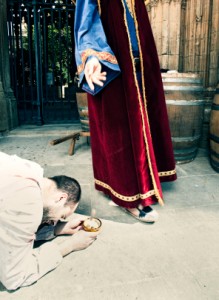Click Here to Download a PDF of This Article
This is part 2 of a 4-part article.
Read Part 1 Here
Read Part 3 Here
Read Part 4 Here
Producer vs. Employee Society
 A society of producers is more likely to promote freedom than a society of dependents. Indeed, only a society of producers can maintain freedom.
A society of producers is more likely to promote freedom than a society of dependents. Indeed, only a society of producers can maintain freedom.
Most nations in history have suffered from a class system where the “haves” enjoyed more rights, opportunities and options than the “have nots.” This has always been a major threat to freedom.
The American framers overcame this by establishing a new system where every person was treated equally before the law.
This led to nearly two centuries of increasing freedoms for all social classes, both genders and all citizens—whatever their race, religion, health, etc.
During the Industrial Age this system changed in at least two major ways.
First, the U.S. commercial code was changed to put limits on who can invest in what.
Rather than simply protecting all investors (rich or poor) against fraud or other criminal activity, in the name of “protecting the unsophisticated,” laws were passed that only allow the highest level of the middle class and the upper classes to invest in the investments with the highest returns.
This created a European-style model where only the rich own the most profitable companies and get richer while the middle and lower classes are stuck where they are.
Second, the schools at all levels were reformed to emphasize job training rather than quality leadership education.
Today, great leadership education is still the staple at many elite private schools, but the middle and lower classes are expected to forego the “luxury” of opportunity-affording, deep leadership education and instead just seek the more “practical” and “relevant” one-size-fits-all job training.
This perpetuates the class system.
This is further exacerbated by the reality that public schools in middle-class zip codes typically perform much higher than lower-class neighborhood schools.
Private elite schools train most of our future upper class and leaders, middle-class public schools train our managerial class and most professionals, and lower-class public schools train our hourly wage workers.
Notable exceptions notwithstanding, the rule still is what it is.
Government reinforces the class system by the way it runs public education, and big business supports it through the investment legal code.
With these two biggest institutions in society promoting the class divide, lower and middle classes have limited power to change things.
Click Here to Download a PDF of This Article
***********************************
 Oliver DeMille is the founder and former president of George Wythe University, a co-founder of the Center for Social Leadership, and a co-creator of TJEd Online.
Oliver DeMille is the founder and former president of George Wythe University, a co-founder of the Center for Social Leadership, and a co-creator of TJEd Online.
He is the author of A Thomas Jefferson Education: Teaching a Generation of Leaders for the 21st Century, and The Coming Aristocracy: Education & the Future of Freedom.
Oliver is dedicated to promoting freedom through leadership education. He and his wife Rachel are raising their eight children in Cedar City, Utah.






Speak Your Mind
You must be logged in to post a comment.